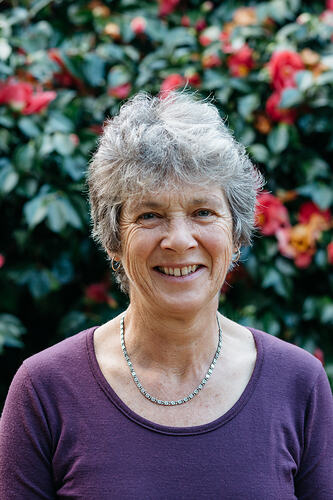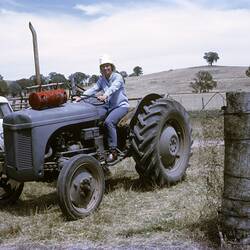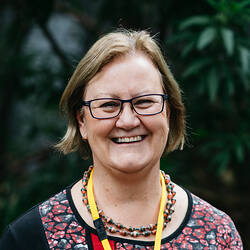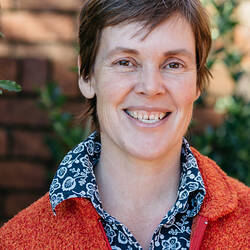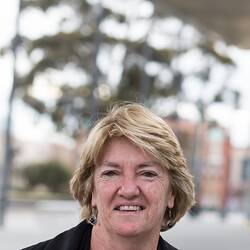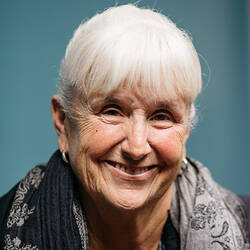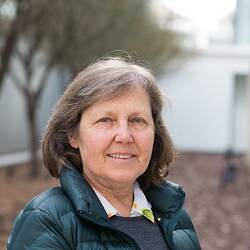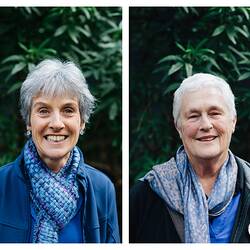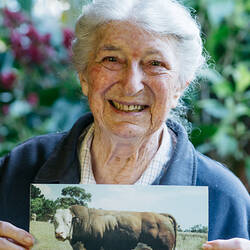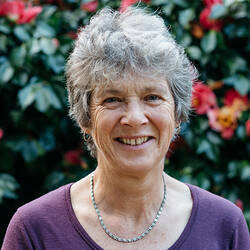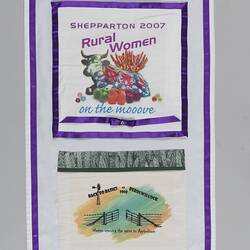Julie Williams is the author of an important report published in 1992 by the Commonwealth Department of Primary Industries and Energy titled 'The Invisible Farmer: A Summary Report on Australian Farm Women.' This ground-breaking report highlighted the historical invisibility of rural women, and argued that 'farming has traditionally been seen as a male domain' despite the significant contributions that women were making on farms. This report emerged during the Rural Women's Movement and provides important documentation of the major issues and concerns that were encapsulated in this movement. As well as authoring the Invisible Farmer report, Julie Williams also played a significant role in developing farm skills courses and discussion groups for rural women in the Gippsland area. She helped to organise the first ever Victorian Women on Farms Gathering in Warragul, Gippsland (1990) and spoke at the 1994 First International Women in Agriculture conference in Melbourne.
The following excerpts were taken from an interview with Julie Williams for the Invisible Farmer Project recorded by Curator Catherine Forge in Warragul, Gippsland, on 29 August 2015.
When did your relationship with farming and agriculture begin?
My parents both came from farming backgrounds. They were Scottish and Irish immigrants in the 1860s and they'd always lived in the Warrnambool area, so although we didn't live on a farm, my father was still involved in a farm machinery business and he enjoyed catching up with all the extended family when he was out doing business, selling hay rakes and fixing tractors. I think I enjoyed doing practical things too, so when I was finishing high school I decided to study agriculture and I went to the Longerenong Agricultural College up in Horsham to do a Diploma of Agricultural Science. It was about 1976 that I enrolled, and it was a time when the women at the agricultural college were only just beginning to increase in numbers. It was only about three or four years before that when Longerenong actually started accepting females.
What do you remember of your education in agricultural science?
Well it was a pretty full, we lived on the farm just out of Horsham at Drung and it was a five day a week study program, 9 to 5 lectures and we were also involved in farm work. So on the weekends or during the week we'd do practical farm work as well. And in the term holidays we'd be rostered on. So there was a dairy, a piggery, poultry, grain, beef enterprises on the farms, and an orchard, that the students were part of. We had involvement running the farm through the year as well as doing the studies, which was a really good practical way of doing it and it also helped the farm have a pretty good labour force on hand to get the jobs done. It was a practical course which I enjoyed. Actually I met my husband at the college and we have a lot of mutual friends still.
Do you remember Julie, when you were studying, did you have an idea in mind of what you wanted to do with your career?
I think just an involvement in agriculture in some way. I just felt that agriculture was a really important part of life and it was a good career to be based in, but I hadn't really thought where it would lead at that stage. I did work on farms of family members and tried to learn as much as I could about the practical side of farming as well. I guess coming from a country area and having that family background with people on farms, they all seemed to be down-to-earth people producing good products, so farming seemed like a very worthwhile thing to do.
How did your education in agriculture impact on your subsequent career path?
I did work on farms for a short time after finishing my studies, but then I was married and started a family so I had about ten years of bringing up children before I then looked again at what career path I might take. In that time my husband worked in the Department of Agriculture and I had had a bit of experience with animal health roles within the Department on a part-time basis. So, again I just felt it was a good area to be involved in and living in Warragul at that stage there was some pretty good opportunities with the Department Research Station at Ellinbank and the other Rural Studies Centres and Adult Education Centres that had different farm related activities. I suppose there was quite a lot of opportunities to go back into that field and the some of the people that we were mixing with, particularly through my husband's job, were involved in agriculture too and we'd also met friends who were milking cows and part of the agricultural scene in Warragul which is a pretty big dairying area.
Let's talk about your foray back into agriculture in the early nineties?
Well I, the opportunity came up to work with our local Adult Education Centre PROCEED on Women on Farms skills course that they were running. They were looking for someone with a bit of background and some skills with administration to carry on that skills course for the following year. So I applied for the job to do that and was successful. So that, that was a really interesting amalgamation of the Department, I think it was called the Department of Agriculture and Rural Affairs at the time and the Victorian College of Agriculture and Horticulture McMillan Rural Studies Centre which was based at Warragul and PROCEED, which was the name of the Adult Education Centre here. I think it was a twelve month grant to do the courses. There was quite a strong group of women who had been involved in establishing the courses in the previous year and they were very supportive to. So, it was a really exciting time to be involved in that group and I was really lucky to get the job. My role was sort of like a coordinator/administrator type role to pull it all together. I worked with the three organisations and, and the existing trainers and technical experts and promote the courses and get the women along.
What did women learn at the farm skills courses?
Really practical courses where they could actually get on the tractors and, and have a go and build up their confidence. Chainsaw use was another one. So that's something that you really need a lot of practical experience with - safety, knowledge and the skills about how to actually do it. So that was another one that the women were just really keen to be able to either build up those skills because they were on their own on the farms or to be able to assist their partners in a more substantial way. Calving was often one of the women's roles and we had calving sessions which were really well received. So it was just to be able to give those sort of skills and allow women the chance to talk amongst themselves too - an exchange of information about how to do these practical things on the farm.
The farm skills courses then led on to more networking?
Yes, the women from the original farm skills courses wanted to have some sort of network to continue their relationship with one another. So they formed a Women on Farms Discussion Group and this was really the first year when I was working on the skills course. The Discussion Group was open to any women who were on the land who wanted to join that group. We would meet once a month, go off to somebody's farm for the day and learn all about what they were doing. There was people from the dairy industry, some who ran goats, some who were beef producers and there were some horticulture businesses as well, so it was quite a range within the farm women who met in that Discussion Group. Then it evolved from the Discussion Group that they felt that they would like to do something on a bigger scale and that's where the Gatherings first started. So there was the sub-committee from the Women on Farms Discussion Group which was the Committee to look into putting on a Gathering, a statewide Gathering of farm women. Shirley Martin was really very instrumental in pushing this and she kept saying that she just wanted to be able to allow a whole lot of women from all around Victoria who were on farms, to get together and talk to each other, share their experience and to give each other confidence in what they were doing and to help them feel, you know, the, the value of what they were doing too. Shirley, in particular, really felt she'd like to help others feel confidence that they could say they were farm women and not just farmer's wives. That was a very common saying at the time, that we're farmers, not just farmer's wives. So that was the start of the first Women on Farms Gathering, which is still going today, twenty-five years or more later. It's quite amazing.
Julie, you ended up authoring a Government report called 'The Invisible Farmer'. How did you find yourself in that position of authoring the report and why did you write it?
It became clear that there just weren't statistics. Often you need statistics to be able to put a case forward for why someone should be recognised or whether a group should get funding. So without statistics on how many farmers were women and what their contribution was, it's hard to put a case together. So that was a little bit of the background. There was also quite an interest in what had been done in the past by farm women but it was difficult to find any information so people might have run something or even written proceedings, but they weren't published, so they were lost unless somebody had a copy of them somewhere. So there was a bit of frustration in, in not being able to sort of gather that history together too, very effectively. So I applied, there was some money around through the federal government, through a Rural Women's Access grant and, and I think it was $4,000 which sounds a very small amount of money now but it did help me to produce the report.
Why did you use the word 'Invisible'?
Well, part of it was the lack of statistics from, from the Australian Bureau of Statistics point of view. There was a conscious decision not to include women on farms as part of the labour force in the annual statistic because it would be seen as our women were doing menial work. It's a long history of the work that women did on farms just being invisible. It just wasn't collected in statistics. The regional and statewide rural publications often, or mostly, had stories about the man on the farm and didn't include the female that was often very much part of it. So, the media was not including them either and also probably because of the informal nature that women do things, the proceedings or other documents around previous conferences or get-togethers that women had had in the past weren't well recorded either.
Did you have support writing the Invisible Farmer Report?
I really wrote it as a response for what everyone was saying. People were saying we need to be more visible, we need to have people counting us, we want people to know what we're doing, we want people in the future to know what we've been doing now, so I really took it on as a job to do, and I was probably one of the ones that had the ability to do it because the women on the farms were pretty busy most of the time doing their farm work. There were other people in the state government departments and there was quite a big Office of Rural Affairs at the time and women within the Department of Agriculture who were very supportive.
What was the outcome of writing the Invisible Farmer Report?
I think the outcome, in a way, even though it didn't give any new statistics or data on the role of farm women it did help to fill that gap. So it was a document that you could give people and say well, these are the issues, these are the things that we need to do to increase the level of visibility but also, you know, this is the background about the extent of the role of farm women at the moment too. It gave an opportunity to wave the flag and get people talking about it.
And the outcome of the Rural Women's Movement more generally?
Well, I suppose the general recognition of women being very significant contributors to agriculture. There's been so many networks developed informally and formally and such a ground swell of farmwomen working together over a pretty big area. So recognition that they can support each other and there's ways of doing it. Hopefully its given farming a better perspective. I don't know what the statistics are, but I'm sure there's been a lot of more women involved at higher levels within the agricultural commodity groups now, and there's certainly a lot of women in the department with farming roles now. The whole movement had an impact and I was really privileged to be involved with such a group of people who were really inspired to change things.
More Information
-
Keywords
Agriculture, Farming, Rural Women, Rural Industry, Rural Victoria, Women's Associations, Conservation, Sustainable Agriculture, Women's Movement, Gender Roles
-
Localities
-
Authors
-
Contributors
-
Article types
